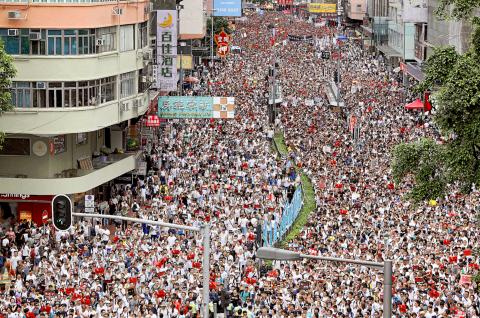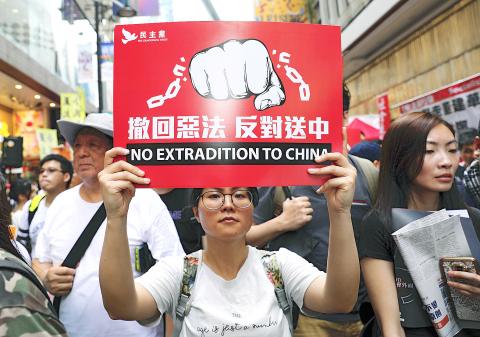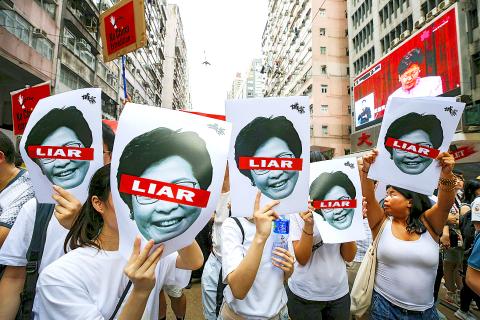Huge crowds yesterday thronged Hong Kong as anger swelled over a plan to allow extradition to mainland China, a proposal that has sparked the biggest public backlash against the territory’s pro-Beijing leadership in years.
Tens of thousands of people marched in blazing summer heat through the cramped streets of the territory’s main island in a noisy, colorful demonstration calling on the government to scrap its planned extradition law.
Hong Kong’s leaders are pushing a bill through the legislature that would allow extraditions to any jurisdiction with which it does not already have a treaty — including China for the first time.

Photo: AP
Coffee shop owner Marco Ng said he was closing his store to join the march.
“Our city matters more than our business,” the 26-year-old said. “If we don’t speak out, then there’s no way that the government will listen to our concerns.”
“The people’s voices are not being heard,” 18-year-old student Ivan Wong said. “This bill will not just affect Hong Kong’s reputation as an international finance center, but also our judicial system. That has an impact on my future.”

Photo: AP
The proposed law has sparked an opposition that unites a wide demographic, setting off the largest demonstrations since 2014 pro-democracy protests brought parts of the territory to a standstill for two months.
In the past few weeks lawyers have held sombre marches dressed in black, anonymous senior judges have given critical media interviews and the territory’s two main legal groups have urged a rethink.
Business figures are also rattled, with multiple chambers of commerce and commercial groups expressing alarm, adding to criticism from the US, Canada, former colonial power Britain and many European governments.

Photo: AP
Online petitions have been gathered by groups as diverse as stay-at-home moms, students, nurses and horse-racing fans.
Hong Kong’s leaders, who are not popularly elected, have said the law is needed to plug loopholes and stop the territory being a bolthole for Chinese fugitives.
They have said dissidents and critics would not be extradited, and have urged quick passage of the bill to extradite a Hong Kong man who is wanted in Taiwan for murdering his girlfriend.
However, critics fear the law would entangle people in China’s opaque and politicized court system and have said the government is using the Taiwan case as a Trojan horse.
The proposed law has been fast-tracked through the Hong Kong Legislative Council, which is dominated by pro-Beijing members and would on Wednesday receive its second reading.
The government has said it plans to have the law on the statute book by late next month.
Previous sessions in the legislature have descended into chaos, with rival lawmakers scuffling.
The march was seen by organizers as an attempt to showcase how wide the opposition to the bill is ahead of the second reading.
The backlash creates a headache for Hong Kong Chief Executive Carrie Lam (林鄭月娥), who has staked her political reputation on the bill passing.
Pushing through the legislation could spark more protests or even a return to the unrest of 2014 — but backtracking might embolden opponents and anger Beijing.
Several senior Chinese Communist Party leaders have voiced support for the bill.

MORE VISITORS: The Tourism Administration said that it is seeing positive prospects in its efforts to expand the tourism market in North America and Europe Taiwan has been ranked as the cheapest place in the world to travel to this year, based on a list recommended by NerdWallet. The San Francisco-based personal finance company said that Taiwan topped the list of 16 nations it chose for budget travelers because US tourists do not need visas and travelers can easily have a good meal for less than US$10. A bus ride in Taipei costs just under US$0.50, while subway rides start at US$0.60, the firm said, adding that public transportation in Taiwan is easy to navigate. The firm also called Taiwan a “food lover’s paradise,” citing inexpensive breakfast stalls

TRADE: A mandatory declaration of origin for manufactured goods bound for the US is to take effect on May 7 to block China from exploiting Taiwan’s trade channels All products manufactured in Taiwan and exported to the US must include a signed declaration of origin starting on May 7, the Bureau of Foreign Trade announced yesterday. US President Donald Trump on April 2 imposed a 32 percent tariff on imports from Taiwan, but one week later announced a 90-day pause on its implementation. However, a universal 10 percent tariff was immediately applied to most imports from around the world. On April 12, the Trump administration further exempted computers, smartphones and semiconductors from the new tariffs. In response, President William Lai’s (賴清德) administration has introduced a series of countermeasures to support affected

CROSS-STRAIT: The vast majority of Taiwanese support maintaining the ‘status quo,’ while concern is rising about Beijing’s influence operations More than eight out of 10 Taiwanese reject Beijing’s “one country, two systems” framework for cross-strait relations, according to a survey released by the Mainland Affairs Council (MAC) on Thursday. The MAC’s latest quarterly survey found that 84.4 percent of respondents opposed Beijing’s “one country, two systems” formula for handling cross-strait relations — a figure consistent with past polling. Over the past three years, opposition to the framework has remained high, ranging from a low of 83.6 percent in April 2023 to a peak of 89.6 percent in April last year. In the most recent poll, 82.5 percent also rejected China’s

PLUGGING HOLES: The amendments would bring the legislation in line with systems found in other countries such as Japan and the US, Legislator Chen Kuan-ting said Democratic Progressive Party (DPP) Legislator Chen Kuan-ting (陳冠廷) has proposed amending national security legislation amid a spate of espionage cases. Potential gaps in security vetting procedures for personnel with access to sensitive information prompted him to propose the amendments, which would introduce changes to Article 14 of the Classified National Security Information Protection Act (國家機密保護法), Chen said yesterday. The proposal, which aims to enhance interagency vetting procedures and reduce the risk of classified information leaks, would establish a comprehensive security clearance system in Taiwan, he said. The amendment would require character and loyalty checks for civil servants and intelligence personnel prior to